Stocks Move Modestly Lower After Seeing Early Strength
8/29/2012 11:17 AM ET
After failing to sustain an early upward move, stocks have moved modestly lower over the course of morning trading on Wednesday. The major averages have pulled back well off their early highs and into negative territory.
The downturn by stocks comes despite the release of two relatively upbeat economic reports, including a report from the Commerce Department showing slightly stronger than previously estimated U.S. economic growth in the second quarter.
With the data largely seen as backward looking, many traders continue to look ahead to Federal Reserve Chairman Ben Bernanke's speech at the Jackson Hole symposium on Friday.
Steel stocks have shown a notable move to the downside over the course of the trading day, dragging the NYSE Arca Steel Index down by 1.9 percent. The loss extends a recent downward move by the index, which has fallen to its lowest intraday level in almost a month.
Airline, gold, and oil service stocks have also come under pressure on the day, while most of the major sectors continue to show only modest moves.
The major averages have climbed off their worst levels in recent trading but currently remain in the red. The Dow is down 14.40 points or 0.1 percent at 13,088.59, the Nasdaq is down 6.32 points or 0.2 percent at 3,070.82 and the S&P 500 is down 1.68 points or 0.1 percent at 1,407.62.
| Canadian Market Report |  | | CADUSD | Oil | Gold | Allbanc |  |  |  |  | | Please click on the images to view our interactive charts | | Commodities Drag TSX Below 12k - Canadian Commentary
8/29/2012 11:20 AM ET
Canadian stocks were extending losses for a third session Wednesday morning as traders cautiously await cues from Chairman Ben Bernanke's speech on Friday at an annual meeting at Jackson Hole, Wyoming.
Investors overlooked today's positive economic data from the U.S., Canada's largest trading partner. While U.S. economic growth in the second quarter of 2012 was stronger than initially reported, pending home sales index reached its highest level in over two years.
The S&P/TSX Composite Index lost 41.54 points or 0.35 percent to 11,968.36, after shedding over 70 points or 0.60 percent in the past two sessions.
Latest data from the EIA revealed that U.S. Crude oil inventories unexpectedly moved up by 3.80 million barrels, while gasoline stocks shed 1.50 million barrels in the weekended August 24. Analyst expected Crude oil inventories to decline 2 million barrels and gasoline stocks to shed 2 million barrels last week. Prices were under pressure after Hurricane Isaac missed oil installations, hitting Louisiana. Crude for October shed $1.02 to $95.31 a barrel.
In the oil patch, Walter Energy , Tourmaline Oil and Baytex Energy Corp. were down around 2 percent each.
Progress Energy Resources eased 0.20 percent after it said its shareholders have approved a takeover bid from Malaysia's state oil company Petronas at C$22.00 a share, or about $6.09 billion.
The price of gold was moving lower as traders await cues from a key central bankers' meeting at the weekend. gold for December shed $9.70 to $1,660.00 an ounce.
Among gold plays, Barrick gold was down close to 2 percent. Goldcorp. and Agnico-Eagle Mines slipped about 1 percent each.
Meanwhile financial stocks were trading firm after two of major Canadian banks posted consensus beating quarterly net-income and hiked their dividend payout.
In the financial space, National Bank , TD Bank , Bank of Montreal and Scotiabank gathered around 1 percent each.
Audio entertainment company Canadian Satellite Radio Holdings Inc. (XSR.TO) surged close to 7 percent after announcing plans to launch expanded features and programming offerings for subscribers.
In economic news Statistics Canada said the Industrial Product Price Index (IPPI) was down 0.5 percent month-over-month in July, largely due to decline in chemical products, motor vehicles and other transportation equipment. Meanwhile, the Raw Materials Price Index (RMPI) rose 0.9 percent, mainly because of higher prices for mineral fuels and vegetable products.
8/29/2012 11:20 AM ET
From south of the border, the U.S. Commerce Department said the economy's growth in the second quarter of 2012 was stronger than initially reported, but still fell short of the growth level posted in the first quarter. The U.S. gross domestic product was revised up to 1.7 percent growth, somewhat stronger than the 1.5 percent initially reported.
Separately, the National Association of Realtors said its pending home sales index rose by 2.4 percent to 101.7 in July after falling by 1.4 percent to 99.3 in June. Economists had been expecting the index to increase by about 1.0 percent. |
| European Market Report |  | | FTSE 100 | Euronext | Dax perf | CAC 40 | 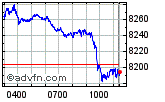 | 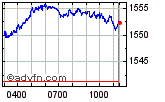 | 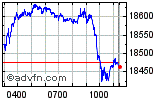 | 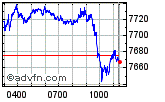 | | Please click on the images to view our interactive charts | | European Markets Trimmed Their Early Losses After U.S. GDP Report
8/29/2012 11:58 AM ET
The European markets turned in a weak performance in early trade Wednesday, but managed to pare their losses in the afternoon. The early weakness was due largely to some disappointing earnings reports across Europe. The upward revision to the U.S. second quarter gross domestic product report was well received in the afternoon. Shares of miners and banks were among the weakest performers.
Investors continue to await Federal Reserve Chairman Ben Bernanke's speech at the Kansas City Federal Reserve Bank's annual symposium in Jackson Hole, Wyoming on Friday. European Central Bank President Mario Draghi announced yesterday that he will be unable to attend the symposium, due to heavy workload foreseen for the next few days.
The European Central Bank may have to adopt exceptional measures sometimes to fulfill its mandate of maintaining price stability, the bank's chief Mario Draghi said Wednesday, in what was seen as a response to German criticism of the central bank's bond purchases.
In an opinion piece published in the German weekly Die Zeit, Draghi said, "The ECB will do what is necessary to ensure price stability." "It will remain independent. And it will always act within the limits of its mandate," he added.
The message on the irreversibility of the euro is very important and policymakers should be careful not to create uncertainty while speaking out on the euro crisis, European Central Bank Governing Council member Erkki Liikanen was quoted as saying.
In an interview with Finnish daily Aamulehti, published Wednesday, Liikanen, who heads the Finnish central bank, suggested that ECB should be more transparent in decision making and should make more information public than was the case earlier.
Italy's borrowing costs for six months declined sharply to its lowest level since March at an auction on Wednesday as investor sentiment was boosted by hopes that the European Central Bank will resume the purchases of peripheral bonds that could bring down the country's bond yields.
The Italian Treasury raised the targeted EUR 9 billion by selling 6-month bills in today's auction. The strong demand for the country's debt was reflected in bids totaling EUR 15.244 billion. The yield on the 6-month paper tumbled to 1.585 percent from 2.454 percent paid in the previous sale on July 27.
The Spanish region of Catalonia sought a financial rescue from the government on Tuesday even as Prime Minister Mariano Rajoy repeated his earlier remarks that the country will not request for a full-blown international bailout.
Catalonia, the most indebted of Spain's 17 autonomous regions, requested for a EUR 5 billion bailout from the EUR 18-billion rescue fund, set up by Madrid to support its debt-ridden regions. Valencia was the first Spanish region to ask for a bailout, followed by Murcia.
8/29/2012 11:58 AM ET
The euro Stoxx 50 index of eurozone bluechip stocks declined by 0.44 percent and the Stoxx Europe 50 index, which includes some major U.K. companies, lost 0.23 percent.
The FTSE 100 of the U.K. dropped by 0.49 percent and the CAC 40 of France decreased by 0.51 percent. The DAX of Germany climbed by 0.11 percent and the SMI of Switzerland gained 0.01 percent.
In Frankfurt, Deutsche Lufthansa fell by 1.42 percent. CEO Peter Gerber reportedly said unlimited strikes over a wage dispute would cost the airline millions of euros in damages per day.
Raiffeisen Bank International sank by 3.18 percent, after the lender forecast a slight increase in the volume of non-performing loans in the second half of 2012.
In Paris, L'Oreal dropped by 4.56 percent, after the cosmetics giant reported a 10.8 percent rise in fiscal 2012 first-half profit, missing estimates.
Hotel group Accor decreased by 3.08 percent, after the company posted a net loss for the first half of the year of 532 million euros, compared to the profit of 41 million euros a year ago.
Bouygues plunged by 8.97 percent. The company reported first half 2012 net profit attributable to the Group of 278 million euros, down 29 percent from 391 million euros last year.
In London, mining stocks and banks were under pressure. Vedanta Resources declined by 1.66 percent and Rio Tinto fell by 3.09 percent. Anglo American dropped by 2.47 percent and BHP Billiton lost 1.47 percent.
Royal Bank of Scotland decreased by 0.80 percent and Lloyds Banking Group fell by 1.64 percent. Barclays finished down by 1.38 percent and Standard Chartered lost 0.81 percent.
SSE climbed by 1.11 percent, after Bank of America upgraded its rating on the stock to "Buy" from "Neutral."
Centrica gained 0.58 percent, despite a downgrade to "Underperform" from "Neutral" by Bank of America.
Germany's inflation based on the EU measure of consumer prices increased at a faster-than-expected rate in August, preliminary data released by Destatis showed Wednesday. The harmonized index of consumer prices rose 2.2 percent year-on-year, following 1.9 percent gain in July. Economists were looking for an inflation figure of 2 percent.
France's business confidence increased slightly in August, after declining in the previous month, survey data released by the statistical office INSEE showed Wednesday. The manufacturing business confidence index edged up to 90 from 89 in July, revised from 90. The score matched economists' expectations.
U.S. economic growth in the second quarter of 2012 was stronger than initially reported but still fell short of the growth seen in the first quarter. According to figures released Wednesday by the Commerce Department, U.S. gross domestic product was upwardly revised to show a 1.7 percent increase in the second quarter, somewhat stronger than the 1.5 percent growth initially reported.
8/29/2012 11:58 AM ET
The upward revision, which was partly due to faster than previously estimated consumer spending growth, was in line with the expectations of most economists.
Pending home sales in the U.S. rose by more than expected in the month of July, according to a report released by the National Association of Realtors on Wednesday, with the pending home sales index reaching its highest level in over two years.
NAR said its pending home sales index rose by 2.4 percent to 101.7 in July after falling by 1.4 percent to 99.3 in June. Economists had been expecting the index to increase by about 1.0 percent. |
| Asia Market Reports | Asian Markets Mostly Up In Positive Territory
8/28/2012 11:34 PM ET
Asian markets are mostly trading in positive territory on Wednesday, despite a weak lead from the U.S. and European markets. However, gains are just modest in most of the markets in the region as the mood remains cautious due to a lack of positive triggers.
In the Australian market, mining stocks are trading weak. Energy stocks opened lower, but regained some lost ground subsequently. Consumer staples and property trusts stocks are edging higher, while financial, industrial and healthcare stocks are mostly trading flat.
The benchmark S&P/ASX 200 index, which declined to 4,346.4, is currently trading at 4,352, down 7.4 points or 0.2 percent from its previous close. The broader All Ordinaries index is down 9.8 points or 0.2 percent at 4,377.2.
Among bank stocks, ANZ Bank , Commonwealth Bank of Australia and National Australia Bank are down with modest losses, while Westpac is trading flat.
Among top miners, BHP Billiton (BHP, BBL) is down 1.3 percent and Rio Tinto (RIO, RIO.L) is trading lower by 2.3 percent.
In the energy sector, Woodside Petroleum and Santos are trading weak. Oil Search and Origin Energy are up marginally, while Caltex Australia is gaining about 1 percent.
Atlas Iron is trading lower by 7.5 percent. Fortescue Metals is down with a loss of 4.6 percent, while Arrium and Harvey Norman Holdings are down 3.7 percent and 3.2 percent, respectively.
Perseus Mining, Bluescope Steel, Qantas Airways, JB Hi-Fi, Paladin Energy, Downer EDI and Whitehaven Coal are also trading notably lower. Lynas Corp. shares are up 5.3 percent. Goodman Group, Beach Energy, Primary Healthcare, AMP and Westfield Group are trading firm.
Worley Parsons tumbled more than 4 percent before staging a smart recovery. However, the stock is still down in negative territory with a modest loss. The company has announced that it posted a net profit of A$353 million for the year to June 30, down three percent from the previous year's A$364 million.
After a smart upmove and a subsequent retreat, the Japanese market edged higher with investors indulging in some selective buying.
The benchmark Nikkei 225 index, which gave up some gains after rising to around 9,070, recovered well subsequently and was up 25.7 points or 0.3 percent at 9,059 at the end of the morning session.
Mining, insurance, railway, foods and real estate stocks found some support, while shares from electric power, chemicals, non-ferrous metals, financial and automobile sectors traded mixed.
Sharp Corp gained over 8 percent. Advantest Corp moved up by about 4.5 percent. NEC Corp, Sumco Corp, Nippon Soda, Sony Corp , Sumitomo Mitsui Trust Holdings, Tokyo Electric Power and Ricoh gained 3 to 4 percent.
8/28/2012 11:34 PM ET
Pioneer Corp, Nippon Electric Glass, Sumitomo Osaka Cement, JFE Holdings, Nippon Light Metal, Chubu Electric Power, Konami Corp, Nikon Corp and Heiwa Real Estate were all trading higher by over 2 percent.
JX Holdings, Nippon Sheet Glass, Alps Electric, Hino Motors, Mizuho Financial, Credit Saison, Konica Minolta Holdings, SMFC, Casio Computer and Pacific Metals were among the other notable gainers.
Renesas Electronics Corp. shares vaulted more than 30 percent on the back of reports that Kohlberg Kravis Roberts & Co. will invest around 100 billion yen in the company for controlling stake.
Daikin Industries plunged more than 5 percent on reports the company will buy Texas-based Goodman Global Inc.
Nippon Paper Group, TDK Corp, Sojitz, Kansai Electric Power, Mitsubishi Paper Mills, Mitsubishi Motors, Nippon Yusen KK and NTN Corp also traded weak.
In the currency market, the U.S. dollar traded in the mid-78 yen range in early deals in Tokyo. The yen is currently trading at 78.60 to the dollar.
Among other markets in the Asia-Pacific region, Malaysia, New Zealand, Singapore, South Korea and Taiwan are trading modestly higher, while Shanghai, Hong Kong and Indonesia are trading weak. Markets across the region ended on a mixed note on Tuesday.
On Wall Street, stocks mostly ended flat after a lackluster session on Tuesday as traders remained reluctant to make any significant moves ahead of remarks by Federal Reserve Chairman Ben Bernanke.
After bouncing back and forth across the unchanged line, the major averages ended the day mixed. While the Nasdaq inched up by about 4 points or 0.1 percent to 3,077.1, the Dow ended down 21.7 points or 0.2 percent at 13,103 and the S&P 500 edged down 1.1 points or 0.1 percent at 1,409.3.
Major European markets ended lower on Tuesday. The U.K.'s FTSE 100 index closed just below the unchanged line, while the German DAX index and the French CAC 40 Index lost 0.6 percent and 0.9 percent, respectively.
US Crude oil futures edged higher on Tuesday with a weak dollar and disruption in production in the Gulf of Mexico due to hurricane Isaac aiding its surge. Light sweet Crude for October delivery ended up 86 cents at $96.33 a barrel on the New York Mercantile Exchange. |
| Commodities |  | | USDCAD | USDEUR | USDGBP | USDJPY | 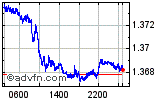 | 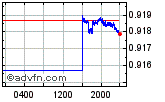 | 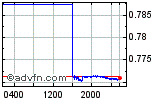 | 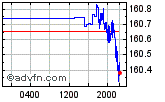 | | Please click on the images to view our interactive charts | | South Korea Current Account Surplus $4.38 Billion
8/28/2012 9:45 PM ET
South Korea had a seasonally adjusted current account surplus of 4.38 billion in July, the Bank of Korea said on Wednesday - up from 3.68 billion in June.
On an unadjusted basis, South Korea saw a record surplus of $6.10 billion, up from $5.84 billion in the previous month.
The financial account saw a net outflow of $7.94 billion, up from $5.27 billion a month earlier, while the capital account saw a net inflow of $0.04 billion.
The goods account surplus widened to $5.32 billion from $5.05 billion a month earlier.
The services account surplus widened from June's $0.17 billion to $0.58 billion due to the improvement of the other services account, for items such as charges for the use of intellectual property rights and business services, the bank said.
The primary income account surplus narrowed from $0.90 billion in June to $0.40 billion, owing chiefly to the decrease in income on equity, the bank noted.
The secondary income account deficit narrowed to $0.19 billion from June's $0.25 billion.
Direct investment recorded a net outflow of $1.44 billion, larger than $0.69 billion in the previous month as foreign direct investment shifted to a net outflow.
Portfolio investment shifted to a net inflow of $2.53 billion from a net outflow of $2.33 billion one month prior, mostly on increased net offshore issuance by residents of foreign currency bonds, the bank said.
Financial derivatives posted a net inflow of $0.27 billion.
Other investment showed a net outflow of $7.68 billion, up from $1.65 billion in June due mostly to increased lending by domestic financial institutions and the shift to a net repayment of their borrowings.
Reserve assets increased by $1.60 billion. |
|
No comments:
Post a Comment